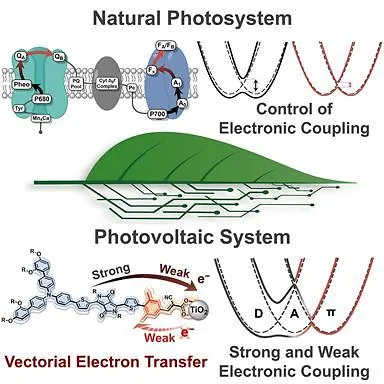Researchers develop efficient solar cell technology by imitating plants' photosynthesis procedure
- By causing a suitable electron flow procedure called vectorial transfer, South Korean researchers had the ability to create a solar cell production technique that can produce cells with as much as 60 percent more electron transfer efficiency than traditional cells. The brand-new technique allows photovoltaic cells to manage electron flow in one desired instructions to minimize the loss of electrons throughout power generation.

Conventional photosensitizers utilized in photovoltaic cells have strong electronic combining features which lose a great deal of electrons when transferred in between molecules as a result of the fast recombination of electrons and also electron holes. Electron holes are positions that lack an electron in an atom or atomic lattice. All-natural photosystems, such as those made use of by plants for photosynthesis, utilize vectorial transfer to control the instructions of electron flow as well as protect against the recombination of electrons as well as holes. Plants show about 100 percent efficiency in the transfer of electrons.
The Ulsan National Institute of Scientific Research and also Technology (UNIST) said in a statement that a joint team involving scientists from UNIST and Japan's Shinshu University created a strategy to create a lot more reliable solar cells making use of a specially made dye that has both strong and also weak digital coupling characteristics to minimize the electron recombination sensation.
Solar cells utilizing the dye showed an optimum photovoltaic efficiency of 10.8 percent, which has to do with 60 percent extra efficient than traditional cells. The rate of recombination had to do with 12.5 percent compared to ordinary photovoltaic cells. "The molecular style method established in this study can be applied not only to solar cells but also to various areas such as synthetic photosynthesis as well as photocatalysts," UNIST scientist Kwon Tae-hyuk was quoted as claiming.
Also read
- CNNP Optoelectronics brings utility-scale perovskite modules out of the lab
- Low-Temperature Sequential Deposition Lifts Inverted Perovskite Solar Cells Efficiency Record
- Self-Assembling Molecule Breakthrough Brings Commercial Perovskite Solar Closer to Market
- Camphor Additives Boost Perovskite Solar Cell Efficiency
- NUS Sets Record With 26.4% Perovskite-Organic Solar Cell
